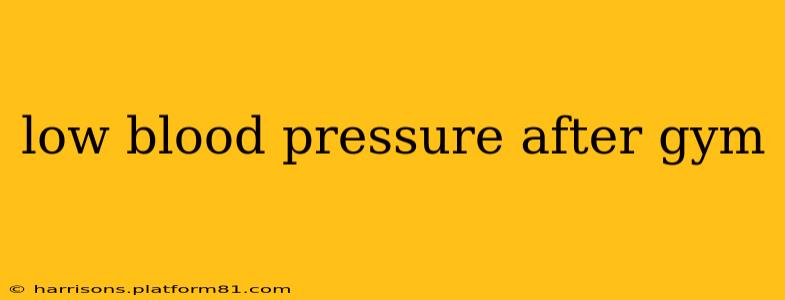Feeling lightheaded or dizzy after a killer gym session? You might be experiencing post-workout hypotension, a temporary drop in blood pressure. While often harmless, understanding its causes and how to manage it is crucial for maintaining your fitness routine safely. This comprehensive guide explores the reasons behind low blood pressure after the gym, how to identify it, and what steps you can take to prevent or mitigate it.
What Causes Low Blood Pressure After a Workout?
Post-workout hypotension is a common phenomenon, particularly after intense exercise. Several factors contribute to this temporary dip in blood pressure:
-
Fluid Shift: During exercise, your body shifts fluids from your blood vessels to your muscles, reducing blood volume. This reduced volume can temporarily lower blood pressure. Dehydration exacerbates this effect.
-
Vasodilation: Exercise causes your blood vessels to dilate (widen) to deliver more blood to your working muscles. This widening reduces blood pressure.
-
Cardiovascular Adaptation: For individuals regularly engaging in strenuous workouts, the body adapts to this stress, leading to a significant vasodilation response even after the workout has ended. This adaptation can cause more pronounced drops in blood pressure.
-
Medication Side Effects: Some medications, particularly blood pressure medications, can contribute to a more significant drop in blood pressure after exercise.
-
Intense Workouts: The more intense the workout, the greater the potential for post-workout hypotension. High-intensity interval training (HIIT) or prolonged endurance activities are particularly likely to cause this effect.
-
Overtraining: Overtraining can deplete your body's resources and increase your susceptibility to post-workout hypotension.
How Do I Know If I Have Low Blood Pressure After the Gym?
Recognizing the symptoms of post-workout hypotension is essential. Common signs include:
- Lightheadedness or Dizziness: This is often the most prominent symptom.
- Faintness or Near-Fainting: Feeling like you might pass out.
- Nausea: Feeling sick to your stomach.
- Blurred Vision: Temporary impairment of vision.
- Weakness: General feeling of weakness or fatigue.
- Headache: A dull or throbbing headache.
Is Low Blood Pressure After Exercise Dangerous?
In most cases, post-workout hypotension is harmless and resolves itself quickly. However, it can become dangerous if it leads to a fall or other injury. Individuals with pre-existing conditions, like heart problems or orthostatic hypotension (a drop in blood pressure when standing up), should consult their doctor before starting an intense workout routine.
How Can I Prevent Low Blood Pressure After the Gym?
Fortunately, there are several steps you can take to minimize the risk of experiencing low blood pressure after your workout:
-
Hydration is Key: Drinking plenty of water before, during, and after your workout is crucial for maintaining adequate blood volume.
-
Proper Warm-up and Cool-down: A gradual warm-up prepares your body for exercise, and a slow cool-down allows your heart rate and blood pressure to return to normal.
-
Gradual Progression: Don't jump into intense workouts suddenly. Increase the intensity and duration of your workouts gradually to allow your body to adapt.
-
Listen to Your Body: Pay attention to your body's signals. If you feel lightheaded or dizzy, stop exercising immediately.
-
Post-Workout Nutrition: Consuming a light snack or meal after your workout can help restore blood sugar levels and prevent a significant drop in blood pressure.
-
Medication Review: If you are taking medication that affects blood pressure, discuss it with your doctor to assess if adjustments are needed.
What Should I Do If I Experience Low Blood Pressure After the Gym?
If you experience symptoms of low blood pressure after a workout:
- Stop Exercising Immediately: Rest in a safe place.
- Lie Down: Lying down helps increase blood flow to your brain.
- Elevate Your Legs: Elevating your legs above your heart can help improve blood circulation.
- Hydrate: Drink water or an electrolyte beverage.
- Monitor Your Symptoms: If symptoms persist or worsen, seek medical attention.
Can Low Blood Pressure After Working Out Be a Sign of Something More Serious?
While usually benign, persistent or severe post-workout hypotension could indicate underlying health issues. If you frequently experience significant drops in blood pressure after exercise, consult your doctor. They can conduct a thorough evaluation to rule out any serious conditions.
This information is for general knowledge and does not constitute medical advice. Always consult with a healthcare professional before making any changes to your diet or exercise routine, especially if you have pre-existing health conditions. They can help you develop a safe and effective fitness plan tailored to your individual needs.
